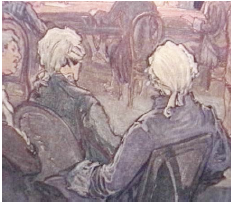Great Britain practised adversarial adversarial: from "adversary"
- a person opposing or resisting
another person. law. Two lawyers argued each side of the case before a judge and jury. The accused was considered innocent until proven guilty. In New France the French inquisitional inquisitional: from "inquisition"
- a thorough investigation
or searching inquiry. approach was used.  There was just you and the judge who was sometimes the local seigneur seigneur: a landowner in New
France whose estates were
originally granted by the King
of France. He also
administered justice within his
seigneury.. You pleaded your case and various witnesses were heard, though each was questioned privately by the judge so no one knew the other's testimony. The accused was considered guilty until proven innocent and it was up to the accused person to make their own case and convince the judge of their innocence.
There was just you and the judge who was sometimes the local seigneur seigneur: a landowner in New
France whose estates were
originally granted by the King
of France. He also
administered justice within his
seigneury.. You pleaded your case and various witnesses were heard, though each was questioned privately by the judge so no one knew the other's testimony. The accused was considered guilty until proven innocent and it was up to the accused person to make their own case and convince the judge of their innocence.
When the judge had heard enough to make a decision, the verdict was given and a sentence passed on the spot. Although this could have been more arbitrary arbitrary: based on one's own wishes, not based on rule or law. than the jury system, most judges tried to be fair. It was certainly a lot cheaper, since you didn't have to hire an expensive lawyer and decisions were reached much more quickly.
